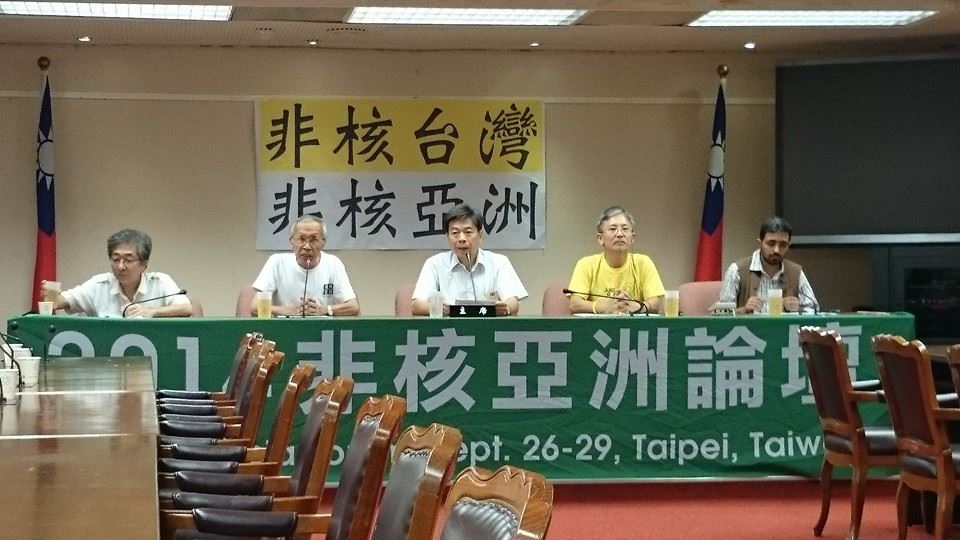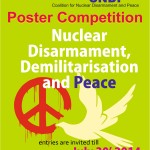Activists from Japan, South Korea, Hong Kong, Turkey, Philippines, India and Taiwan converged in Taipei last week to chart out the common issues across Asia and build solidarity for a nuclear free world. Kumar Sundaram participated on behalf of the CNDP in the Forum. Here is the joint statement adopted by the NNAF 2014 –
September 26 ~29, 2014
Taipei, Taiwan
“Our world is faced with a crisis that has never before been envisaged in its whole existence… The unleashed power of the atom has changed everything save our modes of thinking, and thus we drift towards unparalleled catastrophe.” Albert Einstein, Bulletin of the Atomic Scientists, May, 1946
The unparalleled catastrophe predicted by Albert Einstein fell upon Fukushima in 2011, in the form of the worst nuclear accident in Asia, where situation is worsening by every passing day. TEPCO, the operator has literally no way to fix the crippled reactors. The Advanced Liquid Processing System failed to “purify” radioactive components, and desperate measures like ice walls have failed to function.
As a result, tons of contaminated water is directly discharging into the Pacific Ocean. Dangerous levels of radiation have been routinely detected in meat, fish, vegetables, fruits, soil, sea water, and from human blood and urine. As this endless horror of the NPP accident continues to shock the world, the agony and sorrow of the victims who have been exposed to radiation are equally disturbing.

Sharing our collective anguish at this worsening situation, we came together to highlight the nuclear threat that people in Asia continue to face. Preventing Asia to become the hunting ground of the nuclear industry`s primitive profit machine, we make the following country-specific demands:
Taiwan:
We urge the Taiwanese government to stop operating NPP 1 to 3 immediately and to abolish NPP 4 permanently. We oppose the so-called interim spent fuel dry storage facilities at NPP 1 and 2, since they are likely to become permanent high level nuclear waste dump sites. Nuclear-free homeland, the consensus reached by all major parties in 2001 and being a goal regulated by the Basic Environment Act in 2002, should be implemented without further delay. Effective measures should be adopted to reduce energy consumption, to increase energy efficiency, and to promote renewable energy development. We demand that policies regarding nuclear energy should be decided by the people through democratic means. Therefore, the referendum on NPP 4 proposed through the petition of people should not be denied.
Japan:
Firstly, the Japanese government should abandon the restarting plans of all NPPs including Sendai NPP in Kyushu, located in the earthquake-prone archipelago. Secondly, it has to admit the grave risk facing the children in Fukushima, where more than 100 children, 300 times higher than normal rate, had been diagnosed as thyroid cancer, and some even have metastasis in their lymph nodes or longs. Japanese government should immediately stop “Ethos”, a project that encourage people to live in contaminated areas in Fukushima, and admit their right to relocate and give them necessary financial support. Workers at the NPP should be protected and given appropriate compensation too. At the same time, we hope that every country generously provide those children in contaminated areas a clean environment for their recovering.
South Korea:
South Korea has the largest density of NPPs as per population and space. It has one of the most accident-prone NPPs due to poor management and operation, and the administration of NPPs in South Korea has exposed its inadequate safety measures and rampant corruption. Therefore, we demand the immediate shutdown of the outdated NPP’s in Kori and Wolsong; we demand that all the 23 NPP facilities should be phased out; we demand that no additional nuclear power plants should be installed; furthermore, we demand that S. Korean government should not be involved in brokering the NPP international trade. We support the aspirations of the Korean people of conscience for the nuclear-free nation on Korean peninsula.
Mongolia:
We call for every country, especially Japan, Korea and Taiwan governments, not to import nuclear fuel material from Mongolia. There are many nomadic people in Mongolia whose lives and livestock are suffering from Uranium extraction. At the same time, we request every nuclear-industrial countries not to export any nuclear-related waste to Mongolia and any other country in the world.
India:
The Indian government is undertaking a massive expansion of nuclear energy program, in complete denial of Fukushima. It is importing large number of reactors from the US, France, Russia etc. as part of the bargain that it did to end its isolation after nuclear tests and enter the nuclear weapon states club. To implement its commitment to international nuclear vendors, India has diluted its nuclear safety, environmental and liability norms and is resorting to brutal violence on the local communities resisting these projects. India, along with other Asian countries, must oppose the Convention on Supplementary Compensation (CSC) which shifts the burden of liability from the manufactures / suppliers to the tax payers.
We demand an immediate stop on this nuclear misadventure and violation of the human rights of anti-nuclear activists in India.
The Philippines:
There is an energy crisis in the country made evident by the rotating blackouts and the El Nino phenomenon. The privatization of power plants has become a trend.
The President expressed interest on nuclear energy but little interest in the renewable energy even if the Renewable Energy Law has been passed few years ago. One Congressman is pushing anew to rehabilitate the Bataan Nuclear Power Plant in Morong, Bataan which was constructed some 30 years ago and was built with people’s money amounting to US$ 2.3 billion but never operated. The Department of Energy has plans for 13 new prospective sites for nuclear power plants all over the country. But all these are facing strong opposition from the Catholic Church and the Filipino people.
Turkey:
The Turkey government wants to build NPPs, and comes up with untenable justifications citing energy deficit. Turkey ?mports 72% of its total energy needs. Therefore it is planning 3NPPs – the first in Mersin (Akkuyu), then Sinop and ??neada. But only 4800MW power cannot solve72% energy deficit. The anti-nuclear groups assert that Turkey must get its energy from renewable sources. The solar energy potential is very h?gh in Turkey. We are opposed to nuclear energy in Turkey and in the entire world.
Hong Kong:
We demand immediate closing down of the seven operating nuclear reactors at Daya Bay, Ling Ao and Yangjiang, and the cancelation of the forthcoming over 200 nuclear reactors plans in China. We demand zero nuclear power and weapon on the planet earth.
We strongly condemn the Japanese government’s suggestion of raising the human radiation dose legal standard to 20 millisievert per year. We also demand that the ICRP and IAEA to review the 1 millisievert per year safety level discourse, to specifically and additionally consider the enormous health risks of children and pregnant women under radiation and to enhance our awareness of the harm of low-dose radiation.
We suggest human societies to rethink what is meant by development and the necessity of it. Development may never mean good life when it becomes one of the best rhetorical tools of exploitation by corporations and governments.
——————————————
As mentioned above, we strongly oppose nuclear power, which produces radioactive wastes and can lead to a catastrophic accident, threatening the survival of environment and human-beings. Some of the nuclear power projects came from the Nuclear Non-Proliferation Treaty which has been notorious for its dichotomy of promoting nuclear power in return for not making nuclear weapons. We strongly condemn this NPT system. We strongly demand all countries to give up nuclear power plants as they can be used to make nuclear weapons. NPP and nuclear weapons cannot be separated, and we reject all wars and aggressions.
We also urge the UN to admit the tremendous adverse effects of radiation on the environment, population and coming generations, and to promote the worldwide nuclear phase-out. It is time to abolish uncontrollable nuclear technology and think about alternative energy like wind power, solar power, biomass, etc. We want better regulations for these technologies as well.
No one can escape form the risk posed by nuclear power. The lessons of Fukushima, Three Miles Island, and Chernobyl accidents must be learnt. We must strive together to create a nuclear-free country, a nuclear-free Asian and a nuclear-free world.
All Participants of 2014 Nukes Asia Forum
September 26-29, 2014, Taipei, Taiwan

